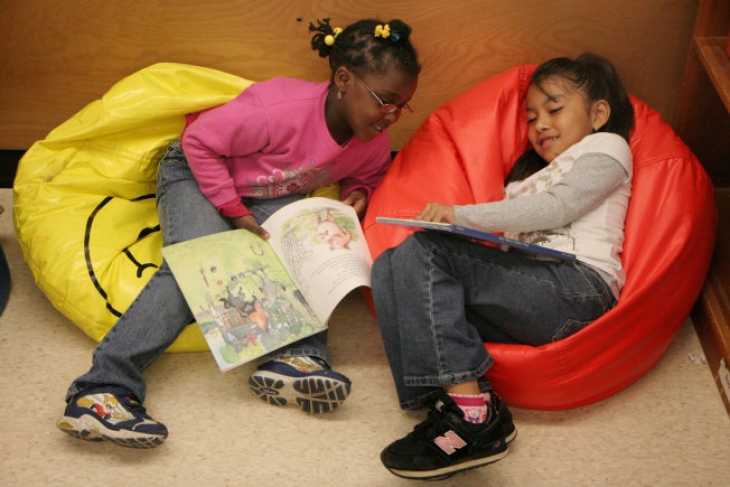This post has been updated with the full text of "No time to lose on early reading"
I’m a fan of the Common Core State Standards, but I recognize there are many reasonable and honorable areas of disagreement about them, both politically and educationally. One recent thread of opposition, however, strikes me as quite unreasonable: the idea that Common Core demands too much by expecting children to be able to read by the end of kindergarten.
A recent report from a pair of early childhood advocacy organizations (Defending the Early Years and Alliance for Childhood) makes the argument that “forcing some kids to read before they are ready could be harmful” and calls for Common Core to be dropped in kindergarten and “rethought along developmental lines.” It’s a really bad idea. Early reading struggles left unaddressed tend to persist, setting kids up for failure. Common Core is not without faults, but its urgency about early childhood literacy is not one of them.
The first red flag in the report is its insistence that Common Core is “developmentally inappropriate.” That sounds scientific and authoritative, but it’s a notoriously slippery concept, harkening back to the day when Piaget theorized that children go through discrete developmental stages. University of Virginia cognitive scientist Dan Willingham points out, “children's cognition is fairly variable day to day, even when the same child tries the same task.” What critics seem to be saying is that Common Core is simply too hard for kindergarten. But that’s clearly not true either.
According to the National Center for Education Statistics, two out of three entering kindergarteners already recognize the letters of the alphabet in upper or lower cases, which is one of the “foundational skills” expected under Common Core. Well over half (61 percent) come to kindergarten on the first day with two or more “print concepts” under their belts, such as knowing that English text is read from left to right and from the end of one line to the beginning of the next. Most of the individual reading standards say small children should be able to demonstrate skills such as answering questions or retelling key details about a story “with prompting and support.” That means talking about stories read out loud. Nothing in Common Core suggests that children should meet these standards as independent readers at age five or six.
The broad thrust of Common Core for kindergarten is ensuring kids are ready to read by the first grade. There is arguably no more important task in American education. A struggling first-grade reader has a nearly 90 percent chance of still struggling in fourth grade; three out of four struggling third-grade readers are still behind in ninth grade. Early reading success or failure is highly predictive of a child’s academic trajectory: One out of six kids who are not reading proficiently by third grade will not graduate from high school on time.
Most importantly, there is no good reason not to set children on the path to reading from the first days of school. As the University of Chicago at Illinois's Tim Shanahan, who helped write the standards and chaired a federal review panel that examined the research undergirding them, has observed, “There are not now, and there never have been data showing any damage to kids from early language or literacy learning.”
The main thrust of criticism in the report laments the loss of play-based kindergarten under Common Core. That’s a legitimate concern, but read the standards (something too few critics take the time to actually do) and you will quickly see that there is not a word dictating how teachers run their classrooms in kindergarten or any other grade. Good kindergarten teachers have always made their classrooms warm, joyful places filled with songs, stories and imaginative play—and made them cognitively enriching. There’s no conflict between the two. If teachers are being told they must change these time-honored practices to meet Common Core standards, it’s worth asking exactly where that guidance is coming from. It’s certainly not in the standards themselves.
There are more than ninety Common Core standards in literacy and math, but the report only seems to have a problem with the one that calls for kindergarteners having an ability to "read emergent-reader texts with purpose and understanding.” That’s edu-speak for being able to read beginning picture books with simple words like “cat” and “boy.” Don’t look for Harry Potter or Charlotte’s Web in your kindergartener’s knapsack anytime soon.
No one wants to see academic pressure bearing down on kindergarteners. That would only lead to uninterested children and with dim reading prospects. But focusing on language in kindergarten does not entail diminished play-based learning. And with the statistics showing what a difference such early learning makes, the idea that reading by the first grade is too much, too soon is a disquieting one indeed. For low-income kids, who grow up with few of the advantages conferred upon them by verbal, well-educated parents and a childhood full of enrichment, just the opposite is true: There’s no time to lose.


